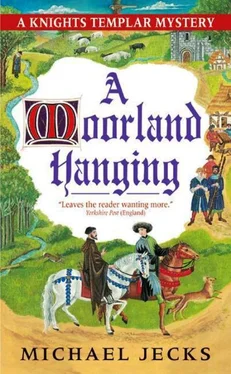It was the same whenever he knew he had upset her. Robert feared no man greatly, not even his father, but his mother was different. The daughter of a wealthy burgess in Exeter, Matillida had been reared to behave imperiously, confident in the knowledge that her wishes carried authority. She still had the deportment of a princess – but now, in the Manor she had taken for her home, she wielded more power than any queen.
In the hall, she led the way to the fireplace, swearing at the bottler and curtly ordering him out, and sat, staring at her son. “Well?” she demanded. Her voice was deceptively cold. She would not let herself fly into a passion, that would be too demeaning, but she could not hide her contempt as she stared at her eldest son. He had good reason to squirm, she thought.
To move to the middle of the moors after the busy social life of Exeter had not been easy, but she had understood her duty. Her father had been glad to have won for her the hand of a man such as Beauscyr. To Matillida’s mind, Sir William was maybe not so comely as other knights, but he was a man of wealth and power then, in 1289, and she was pleased with the way that she had fitted into his household. In the nineteen years since, never had she forgotten her twin responsibilities: to look after the Manor and give her husband the sons he needed. And she had, although two other sons and a daughter had died young, too weak to survive in the harsh moorland climate. Only two had lived, and now the eldest had left the family open to attack. The fool!
“I’m sorry if you were worried for me, but…” Robert began stiffly.
“Don’t be stupid! If you were mad enough to get yourself into trouble on the moors, you know well enough how to look after yourself. And if you were to get yourself killed, at least then you would save us from any other problems caused by your lack of thought.”
“What’s that supposed to mean? I was angry – I had to leave, otherwise I might have said something which could have made problems for us.”
“No, not angry. You were sulking like a child whose plaything has been taken away. You rode off from an important meeting where your father needed you,” her voice began to rise, “and you did it in a manner which guaranteed that all the men in the yard would see and hear. ‘Oh, the poor young master,’ they will all have thought. And where does it leave you in the future? How do you expect them to respect you now? What happens when your father dies? He’s over fifty-five now, he can’t last much longer – and how can you take over his responsibilities if the men think you will run away each time there is a hard decision or negotiation to undertake?”
“That’s hardly fair,” he said, his face flushing. “That cretinous miner Smyth was threatening us, the bastard! He rode in here as if he owned the place, and…”
“You dare to call him cretin?” Her voice was low, but her hands gripped the carved arms of the chair tightly. It was galling that her son was so dense. After the privileged education he had received, he should have realized the implications to the Manor and himself. “He at least knows his power here – you seem to forget it. Do you not recall that under the King’s law, if a miner says there is tin on our land, he can come and seek it out? If he says there is ore beneath our fields, he can ruin our crops if he has a mind to, and don’t…” she held up a hand to stop his attempt at interruption, “…don’t tell me he wouldn’t dare. He has the men to do it. And when he came here to talk, you ran from the room like a maid scared of losing her virginity!”
“I suppose it would have been better for me to stay and challenge him. You’d have liked that,” he said bitterly.
“Don’t be even more of a fool!” Abruptly she stood and stared at him with her hands clasped. “When your father dies, you will be responsible for the Manor, and for me. This man Smyth must not perceive any weakness in you, because he will use it against you. If he thinks that each time he comes here to negotiate with you, all he need do is enrage you, he will know he can control you.”
“But he wants us to pay him not to come on to our lands!”
“I know that. For now, as you say, he wants us to pay him to protect our Manor. If we refuse, he will claim there is tin here, or he will demand that he be allowed to divert the waters from our stream for his workings, or he will cut down our trees to make charcoal for his furnaces – anything. And we know there is nothing we can do to stop him. But soon there might be something we can use against him. For now we must calm him, remain on friendly terms with him, try not to insult or demean him, and persuade him to stay away from the Manor. That is what your father and brother are doing now, trying to keep him happy. After your outburst, it was necessary. Now we will pay. We will mollify the man, befriend him, make sure he is content. Later, maybe, we will gain the advantage and make him regret his presumption!”
“How can we? He’s only a common peasant, no better than Peter Bruther, a runaway villein. Would you negotiate with him?”
“I would negotiate with the Devil himself if it would keep this Manor together!”
The words sank in slowly. For his own mother to spit out such a blasphemy stunned him, but there was no mistake. There could be no misunderstanding her words or her commitment, and suddenly he was not sure that he had ever understood her. Mumbling another apology, he took himself out of the room.
Alone again, Matillida let her breath escape slowly; her rage had dissipated. Surely the boy must understand. He had responsibilities, not merely to the land and the Manor, but to the family. Today, his behavior had endangered all that – and it was unforgivable. She was filled with a sense of approaching danger, suddenly fearful for the safety of this place and her family.
In the yard Sir Robert dragged his feet on the cobbles. He was confused, unsure of himself and even more of his mother. At least soon she would have to treat him better – like a man, not a brainless child. He paused by the stables and watched a groom assiduously rubbing sweat from his horse’s flanks with a handful of straw. Today, with luck, a new life had begun for him. Sir Robert climbed the staircase in the corner which led up to the walkway on the wall.
He was still there, out by the main gate, when two riders came into view. With dull uninterested eyes he watched them canter down the hill. They were men-at-arms, he noticed, from the Manor.
“Open the gates!” one yelled as they came closer.
“Is Sir William here yet?”
As the bolts were hauled back and the gate unbarred, Sir Robert could hear the surly response from the doorkeeper. “You should know – you were out with him. Of course he’s not back!”
“God!”
Sir Robert watched the man jump down from his horse and lead it through the second gate to the courtyard, the second trailing after, both exhausted after their ride, their mounts tired and flecked with sweat. Soon they were surrounded by a milling crowd of ostlers and guards. Something in the hushed anxiety of the scene made him hurry to the inner wall and shout down: “You! What is it? What’s the matter?”
His voice stilled the hubbub below, and he found himself peering down at a group of pale faces. One stood out. It was one of the men, who now stared back with a mixture of nervousness and suspicion. “Sir, it’s the runaway, Peter Bruther. He’s dead!”
The following afternoon, Sir Ralph of Warton was looking out at the view from a low tower, mulling over the news about Bruther, as four figures rode toward Beauscyr Manor. The bailiff of Lydford and his friend were easily distinguishable out in front, and the other two must be servants, he thought. One was close by the knight, moving at the same pace like a well-trained squire, and he caught Sir Ralph’s attention almost immediately. The man was clearly a warrior, and from the way he rode, never more than a few feet from his master’s horse, the two were used to working together. Like his master, he was clad in a light woollen surcoat, but both wore mail beneath, as the occasional glints at wrist and ankle revealed.
Читать дальше












